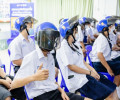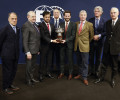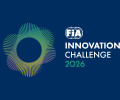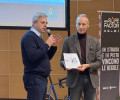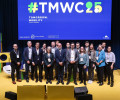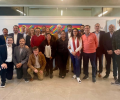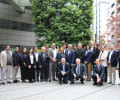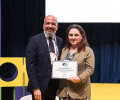THE 2022 FIA REGION II ROUNDTABLE CONCLUDES SUCCESSFULLY IN VIETNAM
On 22-23 September, the 2022 FIA Region II Roundtable gathered FIA Members from Asia-Pacific at Hotel Metropole in Hanoi, Vietnam to address the mobility challenges and opportunities in the region. Co-hosted by FIA Members the Automobile Association of Vietnam (AA Vietnam) and AIP Foundation, the Roundtable brought together more than 60 Club Delegates from 19 countries around the theme ‘Reconnecting in Hanoi’.
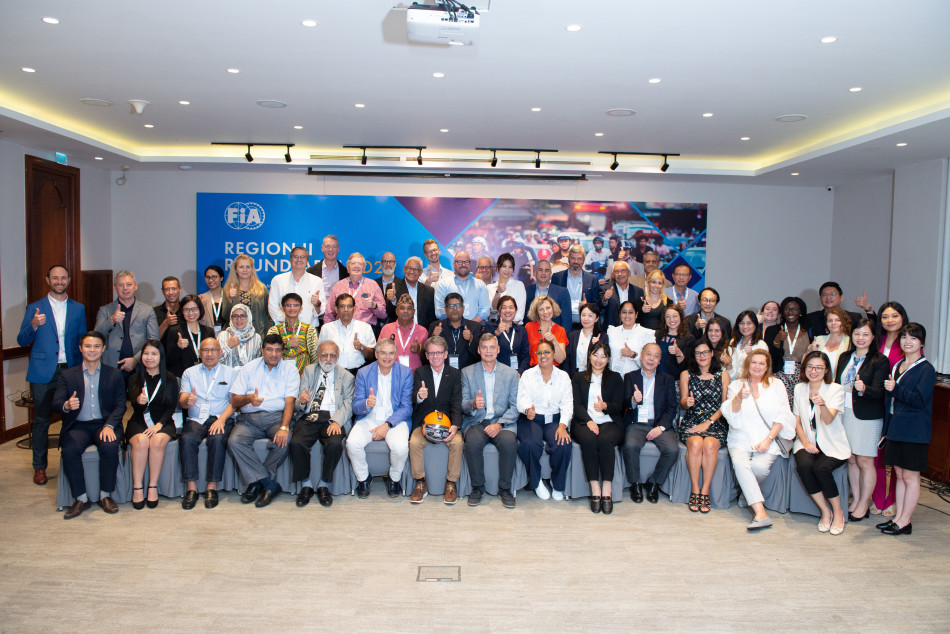
The first FIA Region II Roundtable, since the COVID-19 outbreak, was opened by FIA President Mohammed Ben Sulayem. “I am really happy to see that so many of you have managed to be present in Hanoi today for the FIA Region II Roundtable. You know how much I value the collaboration between our Member Clubs and between our Regions. It is what makes us a family. For two days, you will be discussing the future of Mobility in the Asia-Pacific region, with a focus on tourism, road safety, sustainability and innovation. I warmly thank FIA Region II President Greig Craft for hosting this great event.” he said.
The FIA President was joined by FIA Deputy President for Automobile Mobility and Tourism Tim Shearman and FIA Region II President Greig Craft. “We really appreciate the hospitality from AA Vietnam and AIP Foundation and we thank President Greig Craft for hosting us. It’s been a great couple of days so far and I’m looking forward to the discussions over the next two days. I think it is great to get to meet, some of you for the first time, face to face,” stated Tim Shearman. Hosting the Roundtable also as AA Vietnam and AIP Foundation President, Greig Craft welcomed the participants and insisted on the importance of sharing: “Welcome to all of you. I think we are going to have an interesting day. We have a lot to cover, a lot of very good presentations, and I hope we have also a chance for discussion. So everybody, if you have a question, a comment, please stand up and say something, it is important that we get some engagement sharing” he stated.
Also in attendance of the Roundtable were FIA Senate President Carmelo Sanz de Barros, FIA Secretary General for Automobile Mobility and Tourism ad interim Onika Miller, FIA Director of Tourism Services Habib Turki, FIA Director of Road Safety and Global Advoacy Stefano Ammirati, FIA Foundation Executive Director Saul Billingsley, iRAP Programme Director Greg Smith, and Galeatus Principal Scientist Dr. Terry Smith, along with other FIA experts and external speakers.
The opening session was followed by a joint presentation from Onika Miller and Habib Turki on the ‘Future of Mobility - FIA Strategic Directions and Tourism Opportunities’. The FIA Secretary General for Automobile Mobility and Tourism ad interim introduced the FIA draft Mobility Strategy for 2022-2025, based on the vision: The global leader for safe and sustainable mobility and mission: to serve FIA Members and keep people moving, safely and dynamically. Onika Miller and Laurent Guinand, General Manager of the FIA One Road Programme shared insights on the One Road programme that seeks to harness the collective power of FIA Mobility Clubs through a global rewards platform offering high-value benefits to their members and generating new revenues for Clubs.
The FIA Director of Tourism Services started his presentation by updating delegates on the recent increase in the sales of Carnets de Passages en Douane (CPDs) and International Driving Permits (IDPs). He explained that FIA and AIT sales of CPDs had increased by 388% between 2021 and 2022. After highlighting the devastating impact of COVID-19 on tourism, Habib Turki shed light on tourism opportunities and global trends in post-COVID-19 times such as the rise of revenge tourism after the pandemic, the development of sustainable tourism and the fact that ‘off peak is the new peak’ with travellers now choosing to travel outside of the peak season and going to less popular travel destinations in order to avoid overcrowding.
The FIA Region II Roundtable also featured a session on youth engagement with presentations from Vietnam National Traffic Safety Committee (NTSC) Office Deputy Chief Trinh Thu Ha and Australian Automobile Association (AAA) Managing Director Michael Bradley. After presenting the evolution of motorisation in Vietnam, Trinh Thu Ha highlighted how important it was to enhance youth participation in traffic safety activities through education, public events and volunteering activities, social media and TV programmes, and scholarships and funding. She also presented the National Road Safety Strategy for 2030, emphasising the need for integrated solutions as recommended by the third Global Ministerial Conference on Road Safety.
The floor was then given to AAA’s Michael Bradley to present a case study on youth involvement. Michael Bradley emphasised that to be able to connect with the younger generation and make them want to become future members, Clubs have to understand their concerns and find a new way to talk to them. In particular, he highlighted how important the environmental issue is for them, as well as the values of transparency and accountability. He presented the real-world testing put in place by AAA to evaluate cars’ environmental performance in real life, in comparison to laboratory testing. 30 cars were tested in 2017 as part of a pilot project and AAA now plans to extend it to 60 cars per year thanks to government commitment.
Road safety was another important topic on the Roundtable’s agenda as it is a particularly relevant issue in the Asia-Pacific region. FIA Foundation Executive Director Saul Billingsley presented the Foundation’s programme 2021-2025 to help achieve six global goals: widespread adoption of the Safe System; safe and healthy journeys to and from school for every child; WHO clean air guidelines for urban areas; accelerated transition to low/zero carbon mobility; safe, sustainable and accessible motor sport; sustainable and equitable funding for safe roads, air quality and adolescent wellbeing.
Delegates also learned about ‘Partnerships for Impact’, iRap’s plan for the second Decade of Action for Road Safety 2021-2030 with iRap Global Programme Director Greg Smith, and about the traffic safety management milestones in Vietnam with NTSC Executive Vice Chairman Dr. Khuat Viet Hung — one of the main achievements being the decree that made it mandatory in Vietnam for all motorcycle drivers and passengers to wear a helmet on all roads from 15 December 2007 onwards.
Three road safety sessions were organised on Thursday afternoon by Galeatus Principal Scientist Dr Terry Smith on: the data gaps in measuring road safety; advanced driving automated systems and motorcycle safety; and global report on helmet safety. All sessions gave the floor to FIA Clubs to present their road safety activities to their colleagues and share best practices. Among the pitching Clubs were: Automobile Association of Ceylon, Japan Automobile Federation, Ikatan Motor Indonesia, Chinese Taipei Automobile Federation, Automobile Association of Singapore, Nepal Automobiles' Association, the New Zealand Automobile Association, Federation of Indian Automobile Associations, Automobile Association of Vietnam, and AIP Foundation.
Still in the field of road safety, a session on the FIA Road Safety Grants Programme was organised on Wednesday with FIA Mobility Grants Coordinator Anaïs Aïte and FIA Foundation Programmes Manager Aggie Krasnolucka to help 2022 ‘Transformation’ grantees with the Monitoring, Evaluation and Learning (MEL) framework and give them tools to better measure outcomes, outputs and deliverables of their on-going projects.
The FIA Region II Roundtable also addressed the key topic of decarbonisation and the promotion of sustainable mobility, with a regional perspective. FIA Sustainable Mobility Manager Asuka Ito presented the FIA Environmental Strategy and the tools available to FIA Clubs through the FIA Sustainable Mobility Programme and the FIA Environmental Accreditation Programme. Delegates also learned about the newly created FIA President’s Award for Climate Action. This Award aims to publicly acknowledge and support the work carried out by FIA Member Clubs to bring sustainable and measurable change within the FIA community (and society as a whole) and to incentivise other Clubs to join the collective effort.
FIA Senate President Carmelo Sanz de Barros and FIA Deputy President for Automobile Mobility and Tourism Tim Shearman chaired an open discussion with Club Delegates on the future of the Asia-Pacific region, asking them how can the FIA better support their development and thus empower the region, may it be through education, funding, technical support or lobbying activities.
The closing session of the FIA Region II Roundtable highlighted how FIA Member Clubs can use drone technology and presented the opportunities available through the Drone & Vertical Mobility Academy. Founded by the Touring Club Switzerland (TCS) and supported by the FIA Innovation Fund, this centre of excellence intends to examine pioneering projects from Africa, America, Asia and Europe over the next three years, and provide support to facilitate FIA Mobility Clubs' entry into the vertical mobility ecosystem.
During the two-day event, Delegates also had the chance to visit the Protec Helmet Factory. Created in 2001 by AIP Foundation Founder and President Greig Craft, Protec is the first social enterprise (non-profit) specialising in helmet production and sales in the world. Fostering a socially inclusive workplace, Protec employs 150 workers at its factory, a significant portion of whom are living with disabilities. Region II Delegates also took part in a Delft University residential programme on the Safe System Approach, which will be followed by a series of webinars in the upcoming weeks.
To conclude this successful event, Renee Lang from the Chinese Taipei Automobile Federation announced that next year’s FIA Region II Roundtable will be held in Taiwan and invited all Region II Clubs to attend.

 Facebook
Facebook Twitter
Twitter